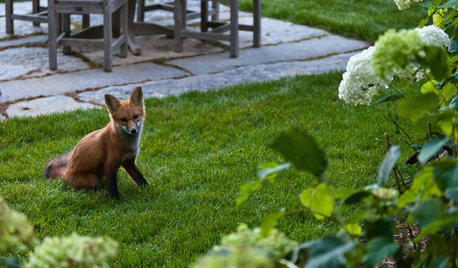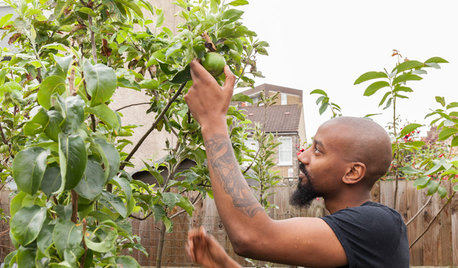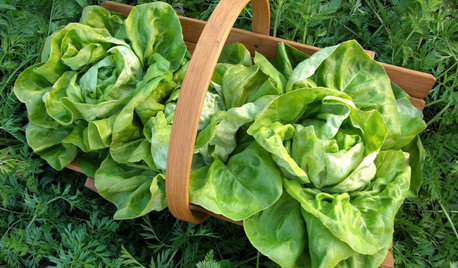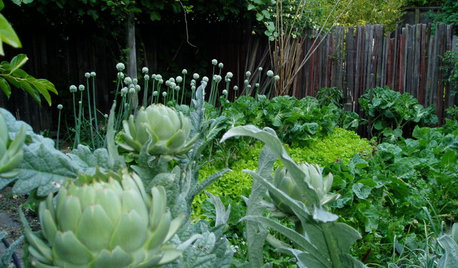Use of Horse manure
bspatial5
18 years ago
Featured Answer
Comments (98)
susiecalyer
15 years agoKimmsr
15 years agoRelated Discussions
Using horse manure, still considered organic?
Comments (5)The Organic Materials Review Institute (OMRI) has this to say about manures, "Livestock manures may be used without restriction on crops not for human consumption. Sewage sludge is prohibited in any form. Unless composted manure meets the definition of the USDA-NOP, (7CFR 205.203 (c)(2), it is considered to be "raw or aged manure" and must be applied and incorporated according to restrictions in 7CFR 205.203(c)(1) for crops for human consumption. These restrictions require 120 days between application and harvest, for crops where the edible portion has contact with the ground, and a 90 day interval when the edible portion of the crop is not in contact with the ground. Currently, dehydrated or pelleted manures must be applied according to the raw or aged manure regulations. Uncomposted plant materials are allowed (205.203(c)(3), and can be applied to the field at any time in the growing season. (See USDANOP regulatory text for exact regulations.)" Composting any manure first, before applying it to your soil, is always the best thing to do....See MorePlease Explain the Protocol for Using Horse Manure on Roses
Comments (22)Kippy-the-hippy, I would suspect that prized horses are treated better than some cattle, unless it is a prized cow that wins ribbons at a county fair; if such a thing even exists. (Think the scenario may have come from a movie).... But truth/fiction....The point is, I don't know what the horses are used for, they may or may not be prized , BUT, I am ambivalent about questioning people. While I do not mind getting my hands dirty here and there, I am a "city girl" growing roses, and in no way a cattle, horse, or even a manure expert. That is why I posed the question seeking guidance from members WHO ARE. Based upon the sage advice I have received, and my situation, my choice is to continue purchasing the steer manure that is labeled to be free of many of the un desirable things and call it a day for now. Given a more comfortable opportunity to acquire horse manure, after this thread, I feel somewhat comfortable in at least knowing what to be on the look out for, which is relative to my OP. Lynn This post was edited by desertgarden561 on Fri, Jun 27, 14 at 17:41...See MoreHorse Manure!
Comments (12)i did kinda side step the key word: FREE!!!!!! ken ps: dont forget.. this is a soil amendment.. [even if applied on the surface] .... it is NOT a mulch ... so you are confusing yourself a bit about the weed potential .... as its inherent purpose.. is not a weed preventative.. as a mulch would be ... and ... some level of seed is or should be expected.. as it is literally the nature of the beast ... the hay [straw with seed].. and forage/silage .. the good part for the animal.. is the nutritious seed.. and the animals.. simply dont completely process all of them ... as they say.. what goes in one end.. comes out the other.. man o' live.. i have apparently spent too much time in my life contemplating 'nure ... lol ... i hope you are mildly entertained by it all ... lol...See Morerisks of using horse manure that is not composted thoroughly
Comments (49)Karen, why use raw manure, you ask? Because the point of using the manure directly is for the nitrogen. The nitrogen that is lost in composting. In fact, many of us use manure in compost because we know it will lose it's nitrogen as it's used to activate that pile. If applied directly to a field and tilled in, more of the nitrogen sticks around and is available when the plant needs it. The bacteria that eat it up in the pile aren't nearly so prevalent in the soil. You can't have the production we have today organically because production today is only possible because we have enough synthesized nitrogen. Farms need as much nitrogen as possible if they don't go synthetic because it doesn't stick around for long in the ground. Especially when you till that ground for planting, which is one of the many reasons for no-till farming. If only composted manure was used, the farms would go out of business thanks to reduced yields. Otherwise, don't you think the USDA would prohibit the use of raw manure altogether? It's necessary. It's that simple. Man has overcome that in only one way, with chemicals. Chemicals not used by those who go the "organic" route. Kimm, what is it with you and changing words but putting them in quotes as if they aren't your own words? (I know it seems like a matter of semantics to some of you, but factory farming is a very intensive method that involves animal cruelty and the overuse of antibiotics, which makes animal feces toxic and sometimes full of mutated bacteria. Not the same as a family farm or an industrialized organic farm.) I said industrialized farming and the organic farm you mention is likely the same as the one that Karen mentioned concerning the huge surprise E-coli outbreak with an organic spinach producer. THAT IS AN INDUSTRIALIZED FARM! Again, you try to twist things. Industrialized doesn't mean non-organic and you know it. This website is supposed to be about helping people. Not misleading them so you look like you know what you are talking about. So stop doing so. Besides, just because something is recalled doesn't mean it was because they used manure and I know you know that, too. Show me which one determined that listeria was from the manure conclusively. I mean, I can actually reference sources. Can you? In fact, all of those that involve listeria that I have found specifically make a point to mention it could be from manure OR soil. Doesn't exactly prove much, now does it? The only ones that were proven to be from manures in soil were the E-coli outbreaks. The salmonella was from manure being sprayed directly on the plants. That has nothing to do with this discussion. The thread is about putting manure on your garden in fall. Not directly spraying your plants with a water-manure mix. Okay. I'll stop on this thread. There are real resources out there. I referenced some. Go enjoy gardening and refuse to live in fear unless the facts (and I mean all of them)......See Morebloosquall
15 years agomn_voyageur
15 years agoseamommy
14 years agomwolson
13 years agofunnystories_yahoo_com
13 years agoKimmsr
13 years agoeno
13 years agoeno
13 years agoeno
13 years agoron_gardner
13 years agokmandley_centurytel_net
13 years agolindalant_aol_com
12 years agogjohnson_eoni_com
12 years agoalbert_135 39.17°N 119.76°W 4695ft.
12 years agoKimmsr
12 years agostuartcurran
12 years agocovella
12 years agocovella
12 years agojolj
12 years agomyrasizemore
11 years agoDiogyphus
11 years agoNancy Barginear
11 years agojankenb
11 years agolittle_minnie
11 years agohaps
11 years agobettreece
10 years agoLeeolson
9 years agoLeeolson
9 years agoKimmsr
9 years agoangcolpat
9 years agoKimmsr
9 years agorenodon
9 years agocybermom1959
8 years agomarymook
8 years agokimmq
8 years agojolj
8 years agostevie
8 years agofertilizersalesman
8 years agostevie
8 years agokimmq
8 years agolittle_minnie
8 years agoeli swan
7 years agokimmq
7 years agofertilizersalesman
7 years agoalvsborg01
7 years agocybermom1959
7 years agotete_a_tete
7 years agojolj
7 years ago
Related Stories

GARDENING GUIDESThe Poop Scoop: Enrich Your Soil With Good Old Manure
Get over the ick factor already — this natural super-ingredient for soil has so many benefits, you'll wonder why you ever went chemical
Full Story
FUN HOUZZThe Cutest Darn Animals on Houzz
You might end up admiring these horses, goats, llamas and more until the cows come home
Full Story
GARDENING GUIDESLush, Foodie Abundance in a Small Urban Garden
This modest backyard garden provides its owner with fruit and vegetables all year round, thanks to an innovative low-maintenance approach
Full Story
GARDENING GUIDESGet on a Composting Kick (Hello, Free Fertilizer!)
Quit shelling out for pricey substitutes that aren’t even as good. Here’s how to give your soil the best while lightening your trash load
Full Story
GARDENING GUIDES10 Easy Edibles for First-Time Gardeners
Focus on these beginner-friendly vegetables, herbs, beans and salad greens to start a home farm with little fuss
Full Story
FRONT YARD IDEAS10 Ideas for a Front-Yard Edible Garden Your Neighbors Will Love
Choosing attractive, well-mannered plants and sharing the bounty will go a long way toward keeping the peace
Full Story
GARDENING GUIDESHouzz TV: Make a Worm Bin for Rich Soil and Happy Plants
A worm-powered compost bin that can fit under a sink turns food scraps into a powerful amendment for your garden. Here’s how to make one
Full Story
GARDENING GUIDESHow to Switch to an Organic Landscape Plan
Ditch the chemicals for a naturally beautiful lawn and garden, using living fertilizers and other nontoxic treatments
Full Story
KITCHEN DESIGNKitchen of the Week: Chestnut and an Open Fire in Connecticut
Antique chestnut boards give a kitchen with a wood-burning oven vintage flair, balancing its modern amenities
Full Story
GARDENING GUIDESNew Ways to Think About All That Mulch in the Garden
Before you go making a mountain out of a mulch hill, learn the facts about what your plants and soil really want
Full Story



squeeze